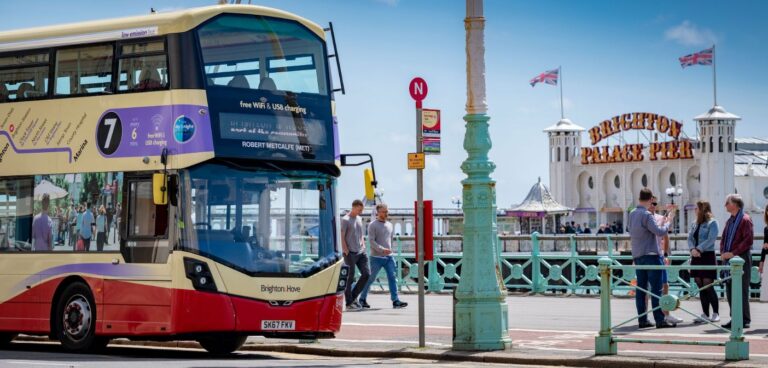The Go-Ahead Group has set out a new strategy aimed at delivering profitable growth and a sustainable future for the public transport business.
‘The Next Billion Journeys’ strategy follows a business review led by group chief executive Christian Schreyer. Three strategic priorities have been identified, aimed at delivering profitable and sustainable growth in existing and new markets:
Performance improvement
- Enhance the basics by focusing on operational excellence, particularly through performance management, standardisation of processes and digitalisation
- Turnaround underperforming operating companies
- Reduce the zero-emission breakeven point to accelerate fleet decarbonisation
Grow organically and externally
- Accelerate passenger recovery and increase modal shift
- Grow in existing geographies, notably the UK regional bus market, maintain London market share and promote an attractive model for passenger service contracts in the UK rail market
- Replicate the successful London and international bus business model in selected international markets, exploring partnership and acquisition opportunities where appropriate
Progress new opportunities by leveraging existing capabilities and resources
- Explore new urban mass transit modes such as metro, light rail and bus rapid transit
- Accelerate in B2B, such as airport transport and rail replacement services
- Explore new services within the mobility value chain with existing capabilities and resources, such as zero-emission services, Mobility-as-a-Service operation and property utilisation
To achieve, these objectives, Go-Ahead’s management team will prioritise five enablers: strengthening governance and transparency; improving digital and data capabilities; consolidating zero-emission capabilities; rebuilding post-Covid confidence with passengers and clients; enhancing people engagement and collaboration; and performance enhancement.
The group has also set several financial targets, including: an increase in annual group revenue to around £4bn, up by around 30%, in the medium-term; an increase in annual group operating profit to at least £150m, in the medium-term; dividend payout between 50% and 75% of earnings per share beginning FY22; and adjusted net debt to EBITDA (pre-IFRS 16) maintained within the existing target range of between 1.5 and 2.5 times.
The company has also reaffirmed its commitment to reduce carbon emissions by 75% by 2035.
Schreyer said: “This is an exciting moment for Go-Ahead. My review of the business has found fundamental strengths in the business, and has identified areas where we can deliver improvements and sustainable growth.
“We plan to strengthen, digitalise and decarbonise our operations, delivering greater profitability and stronger returns to investors alongside improvements for our customers and communities.
“Transport is at a tipping point as we recover from the Covid-19 pandemic. The importance of mass transport is growing, reflecting trends in climate change, digitalisation, urbanisation and demographics around the world; and there are increasing opportunities for private operators to bring their expertise to public transport markets.
“Go-Ahead’s core strength is in commuter transport and we see opportunities to grow by encouraging people to leave their cars at home, by winning new contracts and through carefully selected acquisitions.”
A new operating model will be introduced for all Go-Ahead’s operating companies to deliver more transparency and to increase the focus on financial performance. This will include drilling down on common cost drivers across bus and rail companies – cost of driving, maintenance, energy, fleet and overheads – to identify and address inefficiencies.
A Centre for Excellence will be established at Go-Ahead London to leverage the group capabilities and improve the zero-emission business case and support fleet decarbonisation across the group.
Go-Ahead will also implement initiatives to accelerate passenger recovery – including leveraging data to analyse new travel patterns and to tailor routes, schedules and ticketing to match passenger needs, plus marketing initiatives to rebuild confidence in public transport.
Finally, the company will work to stimulate further modal shift from private cars to public transport, supporting the goals of local and national climate change targets.





